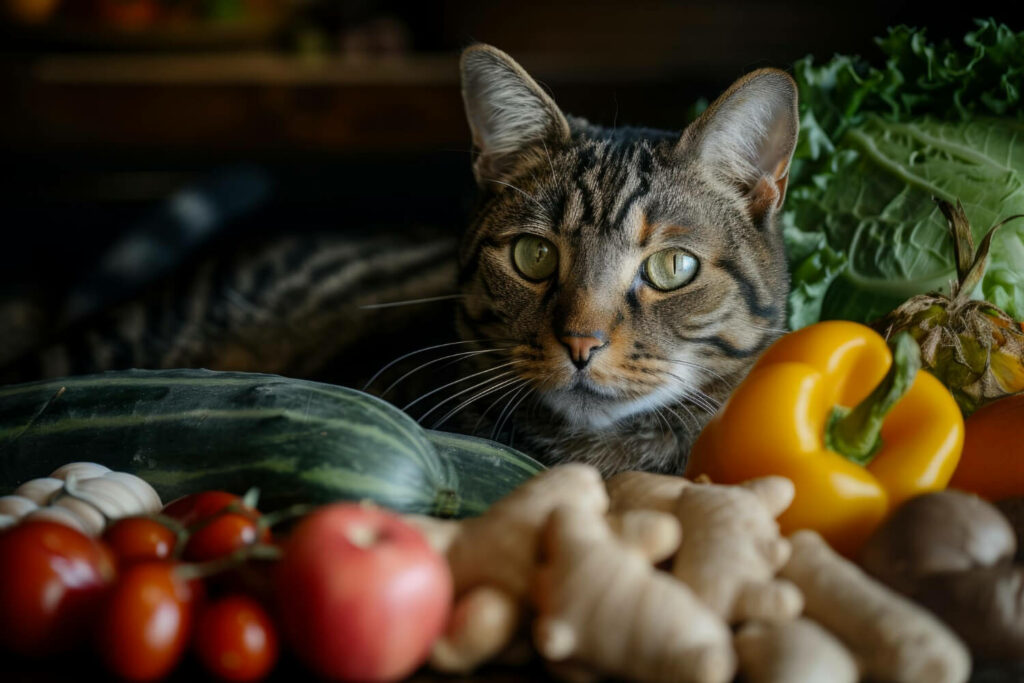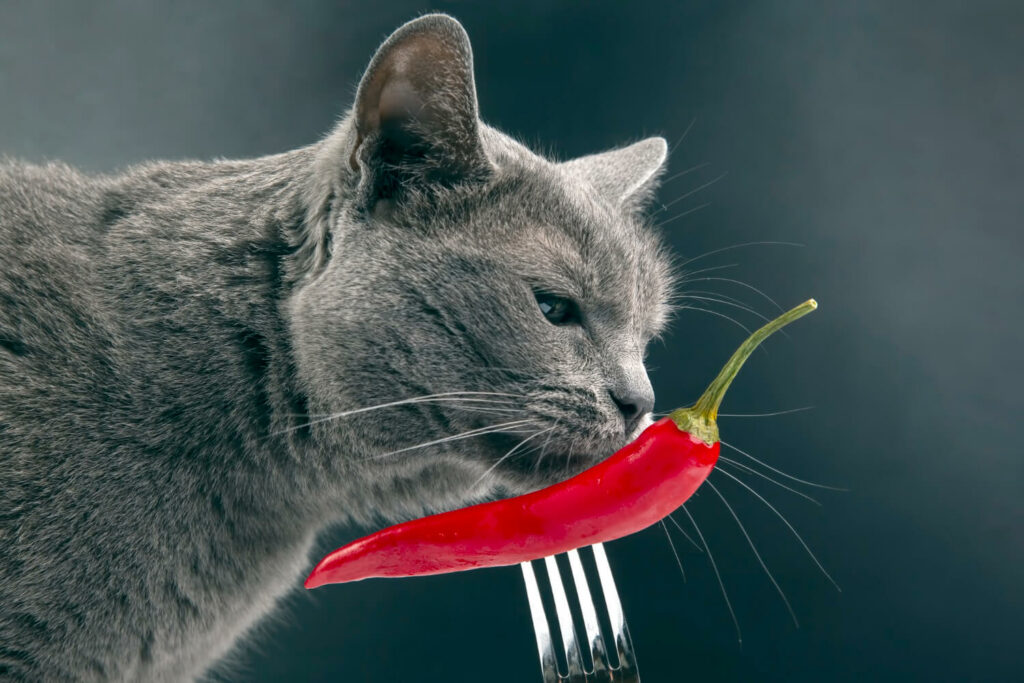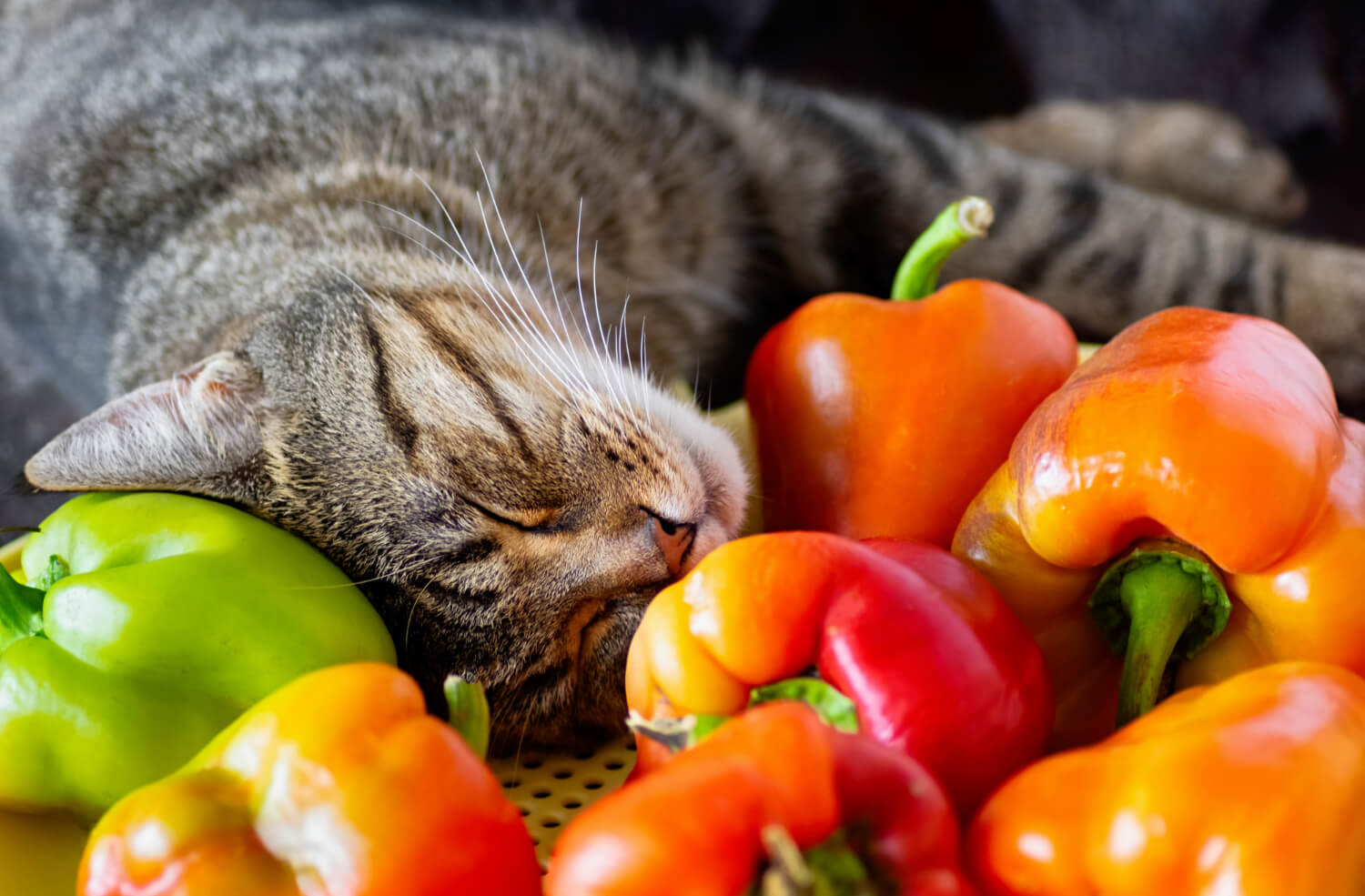Is Paprika Bad for Cats? Surprising Things about Parpika and its Effects on Cats
Paprika is commonly used in various cuisines to add flavor and color to different human foods. But is paprika bad for cats?
The implications of feeding paprika to cats can be concerning. This guide aims to provide a comprehensive overview of paprika’s effects on cats, potential risks, and safer alternatives.
Key Takeaways:
- Paprika contains capsaicin, which can irritate a cat’s gastrointestinal tract, causing vomiting, diarrhea, and stomach pain. It can also cause respiratory issues if inhaled.
- Some cats may have allergic reactions to paprika, leading to itching, swelling, and skin irritation.
- Regular consumption of paprika can cause chronic gastrointestinal issues, dehydration, and long-term health problems in cats.
- If a cat ingests paprika, monitor for symptoms like vomiting, diarrhea, drooling, coughing, or lethargy, and contact a veterinarian if these occur.
- Instead of paprika, consider safe treats like catnip, plain cooked meats, or commercial cat treats designed for feline consumption.
What is Paprika?
Paprika is a type of spice made from grinding dried bell peppers or chili peppers. It ranges in flavor from sweet and mild to hot and spicy, depending on the type of pepper used.
Paprika is rich in vitamins A, E, and C, and contains antioxidants, which are beneficial to humans. However, the effects of paprika on cats are not as favorable.
Is Paprika Bad for Cats?
The short answer is yes, paprika can be bad for cats. While a small amount might not cause immediate harm, there are several reasons why paprika should be kept out of your cat’s diet.
- Capsaicin Content: Paprika contains capsaicin, a compound that can irritate the gastrointestinal tract of cats. Capsaicin is responsible for the spiciness in peppers and can cause symptoms such as vomiting, diarrhea, and stomach pain in cats.
- Gastrointestinal Issues: Even non-spicy varieties of paprika can cause digestive upset. Cats have sensitive stomachs and introducing spices or seasonings can lead to gastrointestinal issues.
- Respiratory Problems: The dust from paprika can irritate a cat’s respiratory system. Inhaling the spice can cause sneezing, coughing, and other respiratory distress.
- Allergic Reactions: Some cats may have allergic reactions to certain components in paprika, leading to symptoms like itching, swelling, and skin irritation.

Potential Risks of Paprika for Cats
Feeding paprika to cats can pose several risks:
- Digestive Distress: Capsaicin and other compounds in paprika can irritate the lining of a cat’s stomach and intestines, leading to discomfort and potential vomiting or diarrhea.
- Dehydration: Gastrointestinal upset from paprika can result in dehydration, especially if the cat experiences prolonged vomiting or diarrhea.
- Toxicity: While paprika itself is not highly toxic, some varieties might contain additives or preservatives that can be harmful to cats. Always check labels for additional ingredients that might be unsafe.
- Long-term Health Effects: Regular consumption of paprika could potentially lead to chronic gastrointestinal issues and contribute to long-term health problems in cats.
What to Do if Your Cat Eats Paprika
If your cat accidentally ingests paprika, monitor them closely for any signs of distress. Symptoms to watch for include:
- Vomiting
- Diarrhea
- Drooling
- Coughing or sneezing
- Lethargy
If any of these symptoms occur, contact your veterinarian immediately for advice. In most cases, the symptoms will be mild and resolve on their own, but it’s important to seek professional guidance to ensure your cat’s safety.
Safe Alternatives for Cats
If you’re looking for ways to add variety to your cat’s diet, consider these safe alternatives:
- Catnip: A favorite among many cats, catnip is safe and can provide mental stimulation.
- Cooked Meats: Plain, cooked chicken, turkey, or fish can be a tasty and safe treat for your cat.
- Commercial Cat Treats: There are many specially formulated cat treats available that are safe and nutritious.
Why Cats and Spices Don’t Mix
Cats have unique dietary needs and sensitive digestive systems, which makes them particularly vulnerable to the effects of spices.

Unlike humans, cats do not have the same range of taste receptors, and their bodies are not equipped to process many of the compounds found in spices. Here’s why cats and spices, including paprika, generally don’t mix well:
- Lack of Taste Receptors: Cats have fewer taste buds compared to humans, and they lack the receptors for sweetness. This means they don’t experience flavors the same way we do, and spicy or seasoned foods can be overwhelming or unpleasant for them.
- Sensitive Stomachs: A cat’s digestive system is designed to process animal protein, and introducing plant-based substances, especially spices, can lead to gastrointestinal distress.
- Potential for Toxicity: Some spices contain compounds that are toxic to cats. For example, garlic and onions, which are often found in spice blends, can cause serious health issues in cats.
Long-Term Health Concerns
While a single, small ingestion of paprika may only cause temporary discomfort, regular exposure can lead to more serious health problems. Here are some long-term health concerns associated with feeding paprika to cats:
- Chronic Gastrointestinal Issues: Repeated ingestion of paprika can irritate the stomach lining and intestines over time, leading to chronic vomiting, diarrhea, and potential development of inflammatory bowel disease (IBD).
- Nutritional Imbalance: Introducing non-nutritive substances like spices can disrupt a cat’s balanced diet, potentially leading to nutritional deficiencies.
- Allergic Reactions: Continuous exposure to allergens in paprika could sensitize a cat’s immune system, making them more susceptible to allergic reactions over time.
Preventive Measures
To protect your cat from the potential harms of paprika, it’s essential to follow some preventive measures:
- Keep Spices Out of Reach: Store paprika and other spices in secure locations where your cat cannot access them.
- Educate Household Members: Ensure that everyone in the household, including guests, understands the importance of not feeding paprika or other human foods to your cat.
- Safe Feeding Practices: Stick to cat-safe foods and treats, and avoid sharing your meals with your feline friend. Make sure to always consult your veterinarian before introducing new foods into your cat’s diet.
FAQ
To provide clear and concise answers to common concerns, here are some frequently asked questions about paprika and its effects on cats:
Can a small amount of paprika harm my cat?
While a small amount of paprika is unlikely to cause severe harm, it can still lead to mild gastrointestinal upset, including vomiting and diarrhea. It’s best to avoid giving your cat any paprika to prevent any potential discomfort or health issues.
What should I do if my cat accidentally eats paprika?
If your cat accidentally consumes paprika, monitor them closely for any signs of distress, such as vomiting, diarrhea, coughing, or lethargy. If any of these symptoms occur, contact your veterinarian immediately for advice and potential treatment.
Are there any spices that are safe for cats?
Most spices are not recommended for cats due to their sensitive digestive systems. However, small amounts of cat-safe herbs like catnip and valerian root can be enjoyable and safe for cats.
Can paprika cause long-term health problems in cats?
Regular exposure to paprika can lead to chronic gastrointestinal issues and other long-term health concerns in cats. To ensure your cat’s health and well-being, it is crucial to avoid feeding them paprika or any other spices.
Is there any situation where paprika might be beneficial for cats?
There is no known benefit to feeding paprika to cats. The potential risks far outweigh any perceived advantages. It is always best to stick to foods and treats that are specifically designed for feline consumption.







